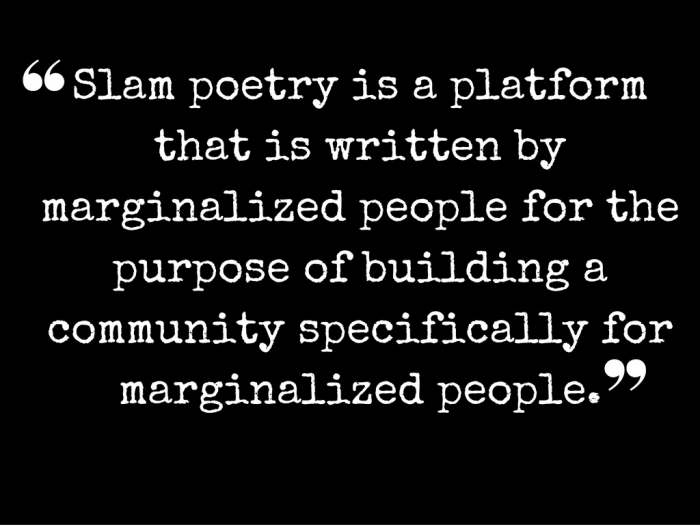The stories told by women of color through slam poetry are not a theatrical performance. Their works are not meant to be pitied, gawked at or viewed as a “multicultural” experience. Slam poetry pieces are intended to be raw, blunt manifestations of instances of oppression. While these poems can certainly be informative through their well-worded rhythmic language, a marginalized person’s trauma should never be viewed as beauty by their oppressor.
Don’t attend a slam poetry open-mic if you are specifically looking for a “feminist” event. As a white audience member, you must take into consideration how poets’ racial identities coincide with their gender identities to multiply the oppression experienced by women of color. Even if you are a white woman, you cannot attend such an event and expect to connect to poets over your shared female gender identity. Women of color are racialized heavily and must resist stereotypical images that specifically oppress us for our skin tone and gender. Because of this, white women cannot co-opt the struggles addressed by women of color through poetry and attempt to align to the problems they both have encountered as women.
Slam poetry is a platform that is written by marginalized people for the purpose of building a community specifically for marginalized people. Poets often address scenarios in which they have dealt with racialized oppression. By doing so, women of color poets aim to establish a connection with their audience members about their shared experience.
Slam poetry is one of the only platforms in which women of color can address our oppressed state without having to rationalize with our oppressors who may question whether or not we are truly marginalized. No justification is required after poets talk about their experiences through their piece. Only snaps and loudly exclaimed “mmmmms” can dictate whether or not the performance resonated with the audience. Slam poems rarely require an explanation to the audience either before or after they are recited. Instead, it is expected that our fellow women of color in the audience can empathize with the stories described throughout the piece.
If you aren’t willing to be an activist and advocate for marginalized people, do not go to a slam poetry performance. Poets do not desire sympathy from non-marginalized people who refuse to fight for the liberation of people of color. Neither do poets desire affirmations for their work from white audience members. Through poetry, poets only desire to express the way that their lived experiences have disadvantaged them in a white supremacist, capitalist, patriarchal society.
Women of color need a space for ourselves in which we are able to express our own identities in accurate, non-stereotypical ways. Slam poetry gives us a viable opportunity to do so.
White people—do not take this space away from us by attending our events without our permission. Open mics are necessary in order to maintain our vitality throughout times in which oppression is rampant. We will need these spaces throughout the next four years in order to resist racialized domination. Do not appropriate our struggles and take our safe space away from us.
Lanna S. Sanchez is a second-year student at Pomona College studying Public Policy Analysis with a concentration in Sociology and a minor in Chicana/o-Latina/o Studies. She is a woman of color who attends slam poetry open mics centering the woman of color experience on a regular basis.




